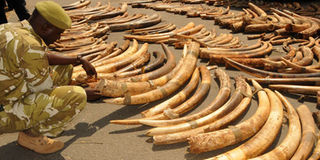Kenya warned over smuggling of ivory

PHOTO | GIDEON MAUNDU A Kenya Wildlife Service warden examines elephant tusks outside the port police station in Mombasa after a container with 3.2 tonnes of tusks was intercepted by Kenya Revenue Authority officers on July 9, 2013. The tusks, which had entered Kenya from Uganda, were destined for Malaysia.
What you need to know:
- Country given six months to stop the illegal activity at Mombasa port or risk blacklisting
Kenya has been given six months by an international organisation to stop the smuggling of ivory and other wildlife cargo through the port of Mombasa.
This follows the recent seizure of several containers with ivory and other contraband destined for the Middle East.
Kenya Wildlife Service (KWS) assistant director in charge of the Coast region, Mr Arthur Tuda, revealed on Tuesday that the Convention on International Trade in Endangered Species of Wild Fauna and Flora (Cites) had issued the warning to Kenya and six other African countries over their ports, which are at risk of being blacklisted.
Mr Tuda made the remarks after the verification of a container carrying 119 bags of ivory from Uganda that was bound for Malaysia.
The seizure comes only a week after another container was impounded with similar cargo.
More than four other containers, which are still being traced, are suspected to be loaded with the illegal cargo.
Two 20-foot containers, also suspected to be have contraband, are at the port undergoing verification.
“We, as KWS, together with our partners, are doing a good job. But we face a big challenge, which, if not well-handled, will see our country with six others on the continent being blacklisted,” Mr Tuda told journalists outside the Kenya Ports Police Station.
He said the government had stepped up the war on poaching, leading to the arrest of more than 200 poachers in the last three months.
“But arresting poachers alone is not the solution to the problem. We have to cut the illegal trade links from the origin to the end of the chain if we are to win this war,” he said.
The latest container has been under surveillance since July 5.
The one impounded at a private yard in Changamwe last week came through the Malaba border post.




